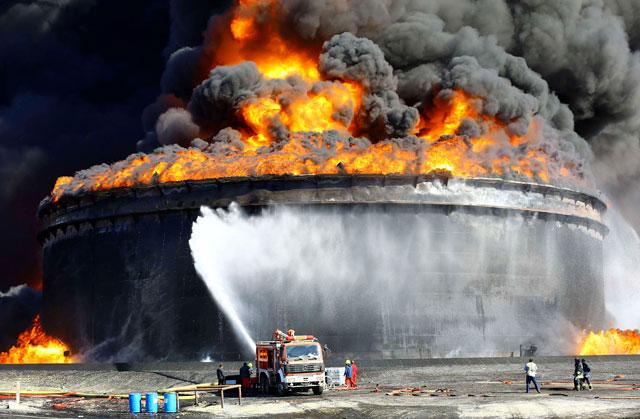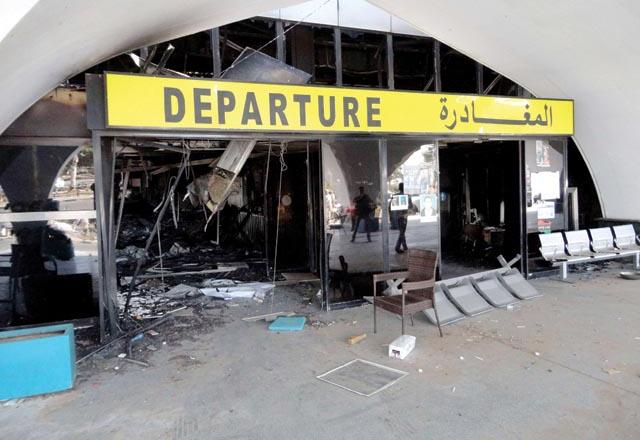You are here
Libyan parliament meets in Tobruk as rival ceremony cancelled
By AFP - Aug 04,2014 - Last updated at Aug 04,2014
TRIPOLI — Libya’s new parliament held its first formal session Monday in the eastern city of Tobruk, as clashes rocked the capital Tripoli and divisions between Islamists and nationalists deepened.
Anti-Islamist MPs insisted on meeting in Tobruk, 1,500km from Tripoli, because of deadly clashes in the capital, some of the worst since the 2011 uprising that toppled and killed dictator Muammar Qadhafi.
State television broadcast footage of the session, showing MPs being sworn in at a ceremony attended by representatives of the Arab League, the United Nations and the Organisation of Islamic Cooperation.
The deputies were to meet again in the evening to elect a speaker, said MP Abu Bakr Biira, who is chairing the session.
Islamist MPs and their allies from the western city of Misrata boycotted the Tobruk ceremony, branding it “anti-constitutional”.
Islamists dominated the outgoing parliament, the General National Congress, and believe that its former chief Nuri Abu Sahmein should have called the meeting of the new assembly.
In a show of defiance, Abu Sahmein invited MPs to Tripoli for a parallel “handover of power” on Monday but the session was later cancelled.
Analysts believe the Islamists are trying to make up for their poor electoral performance by gaining influence through military might.
The United Nations as well as Britain’s ambassador to Libya congratulated the new assembly and voiced hope that lawmakers would be able to restore stability to the oil-rich North African nation.
“The UN Support Mission in Libya [UNSMIL] welcomes the convening of the Council of Representatives amid difficult circumstances for Libya, conditions which call for determination to continue with the political process despite the prevailing challenges,” a statement said.
UNSMIL said it is “hopeful” that the new parliament will take steps to “safeguard the security, safety, unity and sovereignty of Libya” and also called on warring rival militias to observe a ceasefire.
British Ambassador Michael Aron tweeted his felicitations.
“Congratulations to new #Libya Parliament on successful opening in Tobruk today. Hope all Libyans can rally round it & move forward together.”
‘A dark tunnel’
MPs said more than 160 of the 188 elected members travelled over the weekend to Tobruk, which so far has been spared by the violence.
The figure, which could not be confirmed independently, would demonstrate a crushing victory by the nationalists over their Islamist rivals in the elections, in which candidates stood as individuals.
Since mid-July, Libya has seen deadly clashes between rival militias in Tripoli, where fighting broke out again on Monday according to an AFP correspondent, and the eastern city of Benghazi.
Tripoli airport has been closed since gunmen, mostly Islamists, attacked it on July 13 in a bid to wrest control from the Zintan brigade of former rebels who have held it since the 2011 revolt.
In a speech at the ceremonial opening of the new parliament, MP Biira urged “those who carry arms to heed reason and wisdom and chose dialogue” over fighting.
UNSMIL chief of delegation Mouin Borhan also addressed Monday’s session, denouncing the fighting which has seen more than 220 people killed in Tripoli and in Benghazi and around 1,000 wounded.
Borhan warned that the fighting could plunge Libya “into a dark tunnel”.
The government has reported that hundreds of families have been displaced by the fighting in Tripoli, which is also reeling from food and fuel shortages and “a worsening humanitarian situation”.
Foreigners have been fleeing Libya in droves, with the exodus gathering pace at the weekend, when Britain and Greece sent ships to evacuate nationals.
Egyptian Foreign Minister Sameh Shoukry said Monday on a visit to Tunis that up to 10,000 Egyptians fleeing the fighting in Libya are still stranded at the border with Tunisia.
The unrest is seen as a struggle for influence, both between regions and political factions, with authorities failing to reign in dozens of militias in the absence of a structured regular army and police force.
Related Articles
Libyan lawmakers, gathered far from the country’s chaos and warring militias, have elected a judge as the new parliament speaker.
A suicide bomber blew up a car outside the headquarters of Libya's internationally recognised parliament Tuesday, wounding three lawmakers, a legislator said.
The Libyan parliament that was replaced in an election in June reconvened on Monday and chose an Islamist-backed deputy as prime minister, leaving the chaotic country with two rival leaders and assemblies each backed by armed factions.













